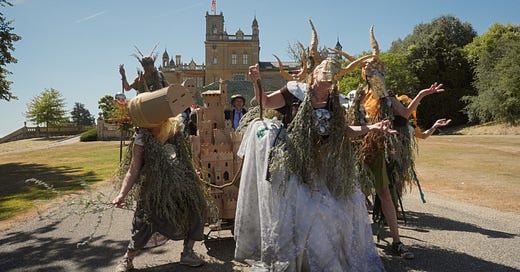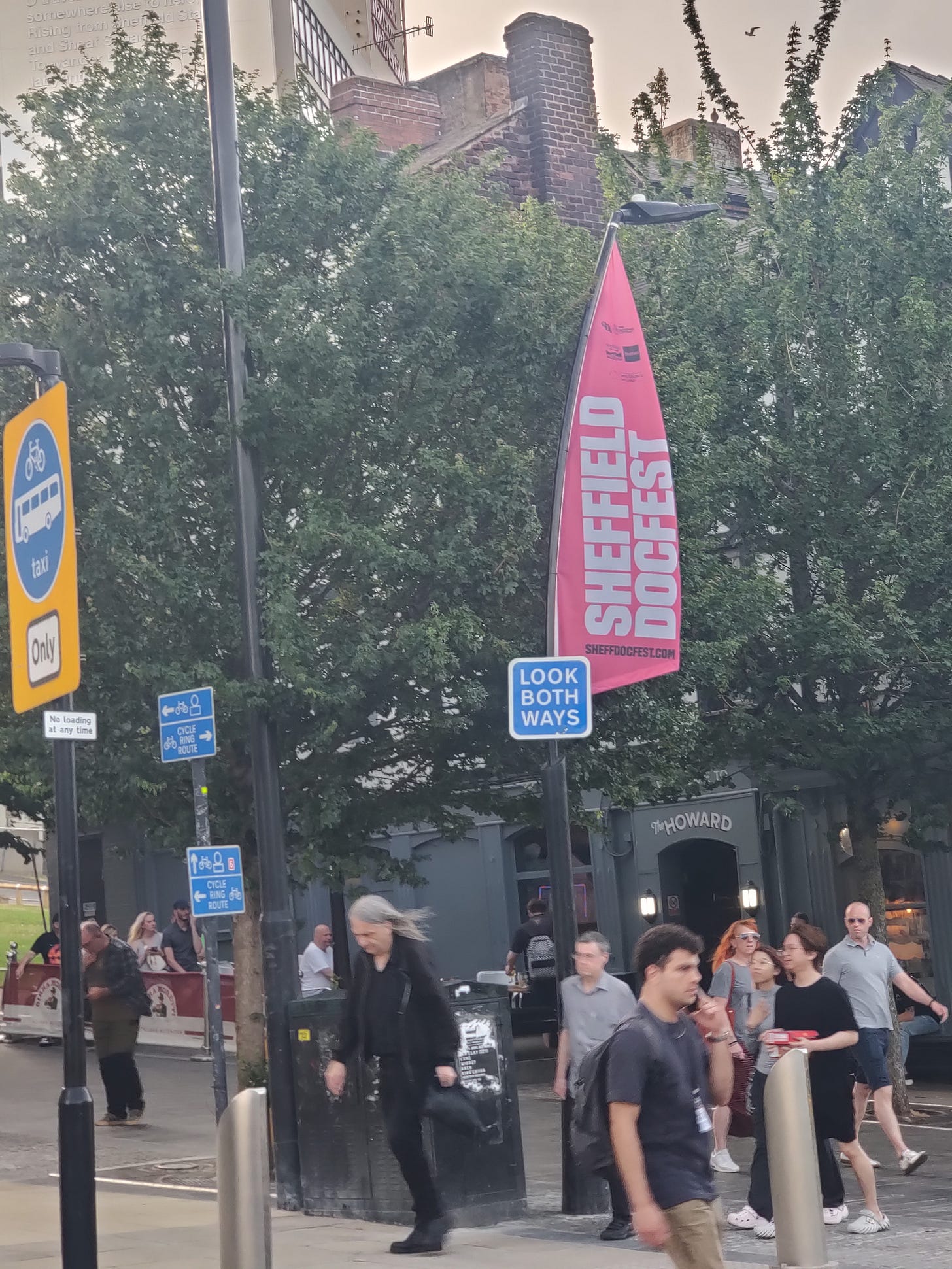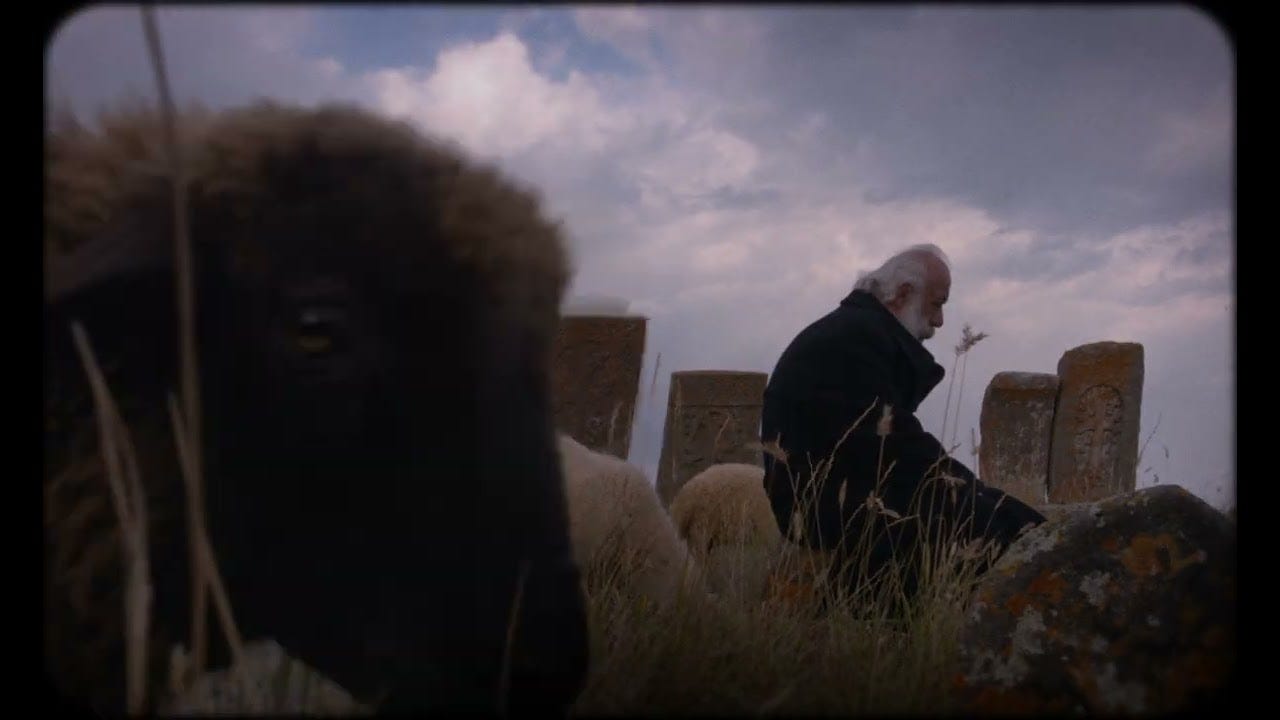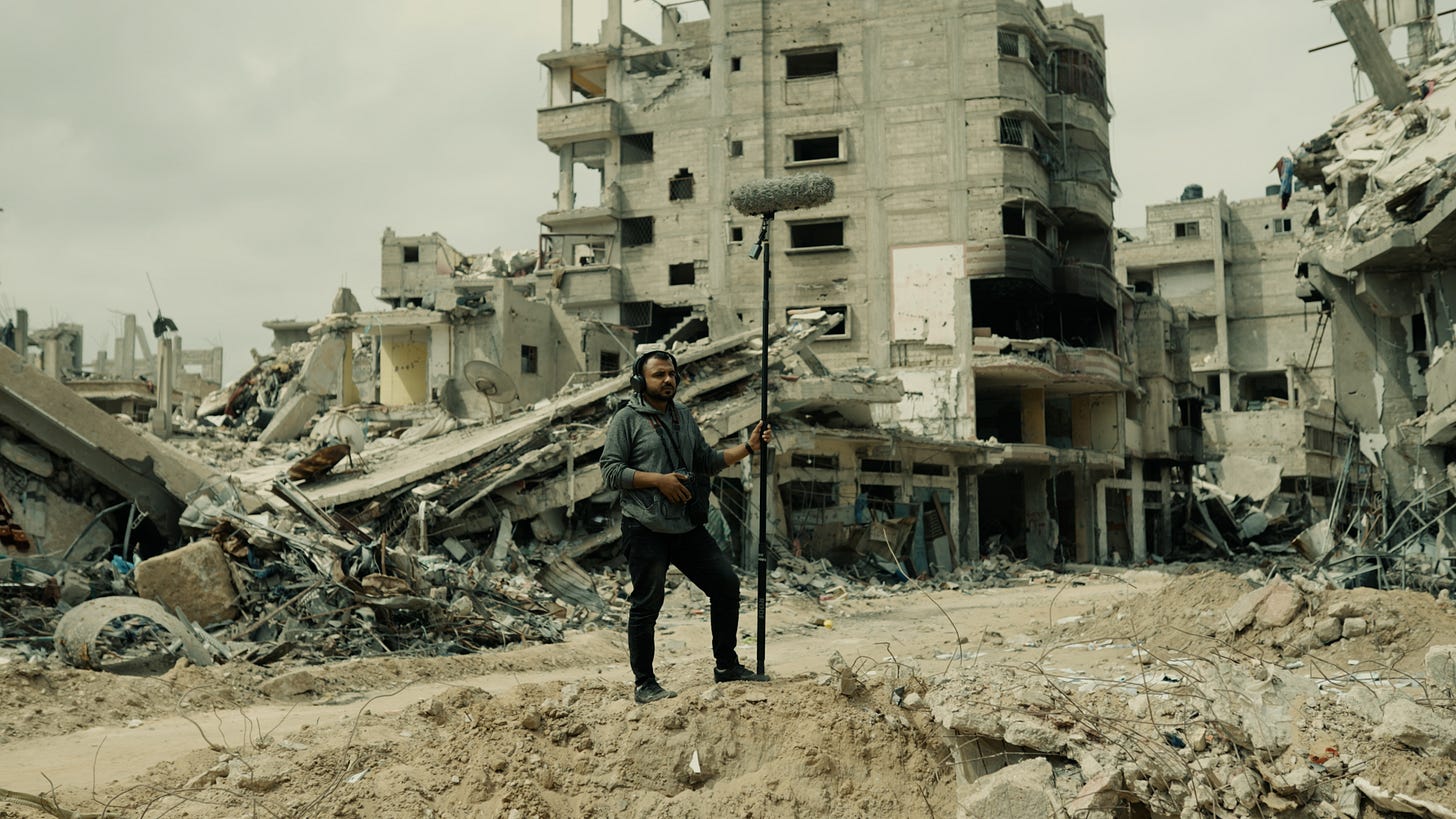Last week, with a free week between book events on the Antifascist Euro Tour, I found myself at Sheffield Doc Fest for the second year in a row. While the fest itself is a little too focused on the hustle and grind of mainstream fundraising and production (obviously a necessity, but not as exciting for outsiders who just like a good time), I enjoyed the opportunity to do a kind of “contemporary documentary vibe check.” What kind of films are being made, and brought to festivals? What are the hot topics? Which techniques are ascendant?
Most of the films on deck were, unsurprisingly, about global politics: Ukraine and Palestine were certainly in the forefront, including colonialism and class-based critiques. Yet compared to last year the films were both more on-the-nose and also stranger, more ambiguous, and certainly more ecocritical. In one of my favorite films of the fest, Hannah Papacek Harper’s Lost for Words, an interviewee talks about contemporary life seeing an “evolution of consciousness” and I haven't stopped thinking about it since. In fact I think every film I saw at the fest, even those I wasn't particularly interested in, demonstrated a kind of collective shifting of priorities— a subtle but significant global transformation. Here are some of the most interesting examples of docs from the fest that embodied this transformation (and some that didn’t quite hit the mark):
André Is an Idiot by Tony Benna
An A24-produced personal documentary about a famous advertising executive who receives a terminal cancer diagnosis does seem like it would be uproariously funny, but believe me, it is. That is, up until the inevitable end, which, following the cleverness of the first two-thirds, hits the audience like a ton of bricks. I didn’t think it was possible to be so touched by something that is fundamentally a PSA for colonoscopies. My favorite part of the film was the jokey claymation sequences that illustrated the titular character’s bizarre imagination, like Michel Gondry’s Science of Sleep on the most unhinged of club drugs. The film’s only detraction is its Neflix-ness, the stylized, sleek quality of made-for-streaming. Its ideology also bends a little too heavily in the Silicon Valley direction for comfort. But, all things considered, I’m thankful to the film for putting the audience face to face with death— as Varda said during Gleaners and I, to enter into the horror of it. As the film will undoubtedly be discussed pretty heavily in the US later this year, I hope it will also inspire more conversations around the way we grapple with the end of life.
Dreamers: People of Light by Imam Hasanov
Possibly, this was my most anticipated film of the festival. Part observational documentary about Azerbaijani high school-age girls playing football (soccer), part sci-fi narrative about astronauts coming to visit them from space, this film was truly a genre of its own. It is possibly too weird and unusual, too seemingly settled in the real until the unreal or surreal takes over, to get mass appeal, but I found its uncanny blend of fact and magic realism extremely charming. Even more charming, however, was the director, whose Q&A was the best I’ve ever seen in my entire life— not least because he refused to answer the usual stupid questions about funding (“Money is a sham, money will not save us”) or less-stupid questions about collaboration with his subjects (“You and me, we are one! We are all one source, the divine light!”) I spent the entire Q&A beaming like an idiot in the second row, ready to give up my rational brain and follow Hasanov into the spiritualist beyond, one in which aliens come to earth to save us from capitalism.
Move Ya Body: The Birth of House by Elegance Bratton
I’ve wanted to learn about the origins of House for decades, as both Chicagoan and dance music fan. Yes, the film isn’t particularly experimental, but it does a great job showing the complex racial dimension of the origin of House. A lot of it revolves around the famous Disco Demolition of 1979, when disco records were burned en masse in Comiskey Park. As an educational tool, the film definitely works— especially in regard to how House music became co-opted by white former anti-House rockers, and how current (white) EDM stars capitalized off of House to become megastars (I’m looking at you, David Guetta). It’s a tale as old as time, and I’m not exactly sure this film brings anything new to light besides the usual VH1 fare. What is more interesting, though, is the sheer number of documentaries tracking musical genres and movements over the last few years. The music doc era is ascendant!
A Little Gray Wolf Will Come by Zhanna Agalakova
Zhanna Agalakova is so famous as a Putin propagandist that even I recognized her. The film documents her slow realization of Russia’s fascistic and totalitarian qualities, and her eventual decision to publicly speak out about Putin’s crimes. On one hand, there is something incredibly powerful about the self-flagellation and self-criticism required to publicly reveal one’s own complicity in international atrocities— especially ones that directly lead to one’s own fattened pocketbook (Agalakova lived an extremely comfortable life in Manhattan with her Italian husband and trilingual private-school-attending daughter for many years, as a foreign correspondent to Moscow). On the other hand, my documentary scholar brain can never turn off its skeptical alarm bells: is the fight between you and your husband truly captured on the fly, or staged? Who pressed record while you were crying in the car? At what point does self-awareness morph into a performance of one’s own victimhood? And, to what extent is the director attempting to control her own deeply problematic narrative? How much is the director profiting off this 180-degree turn, and to what extent is it a case of flipping sides once the winds pushed history definitively in a different direction? I left this with a leaden taste in my mouth.
Lost for Words by Hannah Papacek Harper
Much more beautiful and optimistic, though, was this experimental ecocritical film inspired by the Oxford Junior Dictionary removing several nature-oriented words from the new edition: blue bell, fox, badger, willow, conker, magpie, raven. When the director read an illustrated book called Lost for Words that bring attention to these words for young people, the film was born: a poetic nature doc that interrupts gorgeous high-definition drone images of the English countryside with soft, empathetic observational footage and folk- and nature-inspired music by the musical group and choir Spell Songs. The film describes itself a “scientific film with an artistic heart,” but thankfully the artistic is definitely predominant. The film weaves seamlessly between its disparate elements, creating an immersive, magical, and dreamlike feeling that is easier felt than described. No ethnonationalism can be found here, even though the film is definitively set in England; it is about all people, flora, and fauna, and embodies an ethic of care rarely seen in a documentary with such high production value. I was astonished.
Our Land by Orban Wallace
My other favorite film of the fest traced the Right to Roam movement in England— the right to access “private” land, like open country, even without the express consent of the owner. This is a hugely popular protest movement in England and entirely unknown to me before this film. I’m not much of an anglophile, and this film did a beautiful job of describing the history of land ownership in England, and how randomly plots of land were apportioned by William the Conqueror in the 11th century to his baron friends (and, consequently, how many aristocrats continue to profit off of this land to this day). I loved images from the protests— what they call “mass trespasses”— full of happy, multigenerational, ethnically diverse crowds, donned with folk- and animal-inspired garb: cardboard owls, deer antlers, linocut print-inspired images of ravens and foxes. The film takes a seemingly obvious premise— shouldn’t people have access to nature outside of a few defined footpaths, when the upper classes aren’t actively using so much of the rich land that they’ve inherited?— into something more revolutionary: the rejection of the concept of land ownership, and an implied abolition of private property as such.
Lullaby for the Mountains by Hayk Matevosyan
The word “documentary” is always contentious, and no film I saw at the fest pushed the boundaries of the term more than this gorgeously shot poetic debut set in Armenia. Hayk Matevosyan enlisted his father Ashot to serve as actor in a film with 15 chapters and no camera movement nor dialogue, set in the highlands of Armenia. Shot on what appears to be a Bolex with a curiously warped lens (producing a kind of distended effect in the lower half of hte frame), the film is nothing if not meditative. It is also clearly in the tradition of Sergei Parajanov, especially Color of Pomegranates. In the Q&A, Matevosyan said the Parajanov connection had a synchronous and magical dimension: he borrowed a horse from a farmer, and then found out the same elderly farmer had loaned horses to Parajanov himself! Béla Tarr served as executive producer for this film, and this influence is certainly felt— in the poetry of the landscapes, in the mood, in its fundamental indefinability.
Space to Breathe by Juicebox P. Burton
I like watching shorts and I saw quite a few at the fest, but none were as exciting as this abolitionist sci-fi documentary (sci-fi documentary truly having such a huge moment! The entire series of shorts were some version of the term— unheard of in previous years!!). Space to Breathe is a documentary about the present shot from the future, from a world in which cool young 20-somethings with Afrofuturist headpieces celebrate Abolition Day, and practice restorative justice. It reminded me of a book I frequently describe on this Substack, Everything for Everyone: An Oral History of the New York Commune, 2052-2072, in its valiant and powerful desire to imagine a world in which the Left actually wins. It’ll be screening at Blackstar in Philadelphia in about a month, and I highly recommend everyone see it. I’ll be teaching it soon for sure!
Gaza Sound Man by Hossam Hamdi Abu Dan and Awad Joumaa
There were many films about Palestine at Sheffield, and although all looked emotionally resonant and important, I was most curious about this one, which tracks a sound engineer Mohamed Yaghi as he tracks the aural journey of his native land. I’ve been a lot more interested in field recordings recently, and the way they create a rich, immersive landscape that creates almost a feeling of teleportation into another world. The film is produced by Al Jazeera and thus has a particularly journalistic dimension (which I don’t often love, to be honest), but Yaghi’s musings on the ethics of capturing sounds of grief and horror are extremely striking. The film was both reflective and agitational, a combination that can’t help but produce more than a bit of discomfort. In fact I think the film does this explicitly: immersing the viewer in horrors beyond their comprehension as a way of forcing a reckoning and confrontation with their own complicity.
All for now! Thankful to have gotten a glimpse into international and UK documentary worlds for the second year in a row (and to also thankful for the shockingly good gelato at the Showroom Cinema in Sheffield). See you next time! xo-J

















